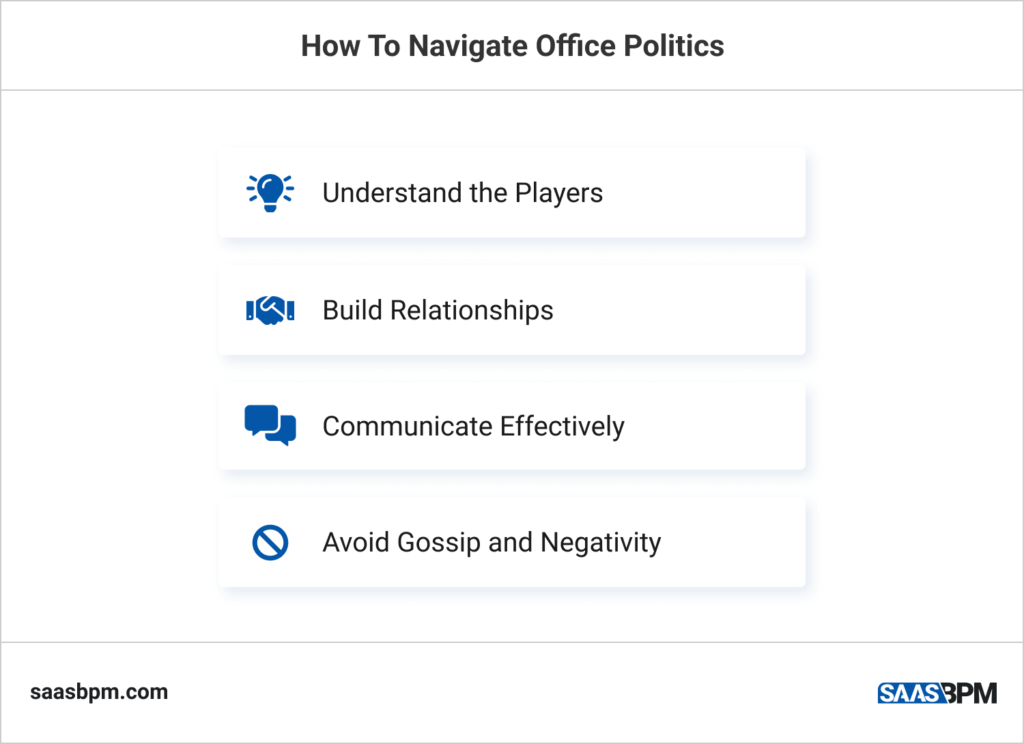Embarking on a professional journey inevitably leads to encounters with the intricate dance of office politics, an ever-present backdrop in the corporate landscape. Navigating these subtle power dynamics, alliances, and unspoken rules is not just a challenge but an essential skill for career success.
Office politics, often laden with complexities, can influence decision-making, career trajectories, and overall workplace dynamics. Acknowledging their existence is not an endorsement but a strategic recognition of the environment in which professionals operate. Whether you’re a seasoned executive or a recent graduate entering the workforce, understanding the nuances of office politics is akin to possessing a compass in an unfamiliar terrain.
In fact, 60% of employees acknowledge the direct influence office politics have on their career progression. However, many companies are actively fighting against the negative impact such dynamics have on the work process, such as stress, job dissatisfaction and toxic behaviours.
The ability to navigate office politics is a skill that goes beyond job descriptions and technical expertise. To a great extent, it shapes the trajectory of careers and determines the level of success one can achieve in the professional realm. In this article, we will describe 4 basic steps to cope with office politics.

Understand the Players
Understanding office politics requires a nuanced exploration of the key players within the organization. Identifying these individuals goes beyond job titles; it involves discerning their motivations, alliances, and the power dynamics that shape decision-making.
In any workplace, there are influencers—individuals who hold sway over critical matters and possess the ability to shape the direction of projects and initiatives. Recognizing these power brokers is essential for strategic positioning and effective collaboration.
Motivations vary widely among colleagues, from a focus on personal advancement to a commitment to the team’s success. Some may prioritize innovation, while others emphasize stability. By understanding the diverse motivations at play, professionals can tailor their interactions to resonate with the values and goals of those they seek to collaborate with.
Alliances within the workplace form the bedrock of office politics. Identifying who aligns with whom, who holds informal influence, and who collaborates regularly sheds light on the underlying currents shaping the organization’s dynamics. This awareness enables individuals to navigate the social fabric of the workplace effectively, forging alliances that contribute to both personal and collective success.
Power dynamics, often subtle and unspoken, play a pivotal role in decision-making processes. Recognizing who holds formal authority and who wields influence behind the scenes allows individuals to navigate the organization’s political landscape with finesse. From team dynamics to interdepartmental collaborations, comprehending the power structure facilitates strategic decision-making and enhances the ability to positively impact the organizational narrative.
Build Relationships
Building robust relationships is the linchpin of navigating office politics with finesse. The professional landscape is inherently social, and success often hinges on the ability to forge meaningful connections with colleagues, managers, and other key players within the organization.
Colleagues form the immediate network within a workplace. By fostering strong relationships with team members, individuals can create a supportive and collaborative environment that fuels collective success. This involves not only acknowledging individual strengths and contributions but also actively seeking opportunities for mutual growth and accomplishment.
Managers hold a pivotal role in the professional journey. Establishing a positive and open rapport with managers fosters a sense of trust and reliability. Clear communication, alignment of goals, and a proactive approach to problem-solving contribute to a healthy working relationship, positioning individuals for mentorship and advancement.
Key players, those who wield influence and contribute significantly to decision-making, should be approached with strategic relationship-building in mind. By understanding their motivations and aligning with their objectives, individuals can create alliances that go beyond casual interactions, contributing to a supportive network that extends influence and opens doors to professional opportunities.
Communicate Effectively
Effective communication stands as a cornerstone in the art of navigating office politics. Developing robust communication skills is not just a professional nicety but an indispensable tool for success within the complex dynamics of the workplace.
Active listening is a fundamental aspect of effective communication. By attentively engaging with colleagues, managers, and key players, individuals not only glean valuable insights but also convey a sense of respect and understanding. This skill fosters a collaborative atmosphere, where ideas are heard, and perspectives are acknowledged.
Clear messaging is the linchpin of avoiding misunderstandings and fostering transparency. Articulating ideas succinctly and ensuring that messages are conveyed with precision minimizes the potential for misinterpretation. Clarity in communication is particularly crucial when navigating the delicate nuances of office politics, as it enables individuals to express their thoughts and intentions with confidence and impact.
Conflict resolution is a skill that goes hand-in-hand with effective communication. In any workplace, differences of opinion are inevitable. Being adept at resolving conflicts diplomatically and constructively contributes to a positive work environment. Navigating office politics often involves mediating differing viewpoints and finding common ground to propel projects and initiatives forward.
Moreover, effective communication extends beyond verbal interactions to encompass written communication. Emails, reports, and other written documents should be clear, concise, and aligned with the overall goals of the organization. The ability to convey complex ideas in writing ensures that communication is seamless and that everyone involved is on the same page.
Avoid Gossip and Negativity
Steering clear of gossip and negativity emerges as a guiding principle for maintaining a positive and constructive professional environment. While workplace chatter is inevitable, consciously choosing to abstain from participating in gossip and negative discussions is a strategic decision that contributes significantly to one’s professional reputation and the overall workplace culture.
Gossip, often fueled by speculation and hearsay, can breed mistrust and create a divisive atmosphere. By refraining from engaging in or perpetuating gossip, individuals can position themselves as reliable and trustworthy colleagues. This not only enhances professional relationships but also shields individuals from being drawn into potentially damaging situations.
Negative talk, whether directed at colleagues, superiors, or organizational decisions, can erode morale and hinder productivity. Instead of contributing to a pessimistic narrative, individuals who focus on constructive and positive conversations become catalysts for change and improvement. Shifting the discourse toward solutions, innovation, and opportunities for growth cultivates an environment where challenges are met with resilience rather than defeatism.
Moreover, avoiding gossip and negativity is an investment in personal well-being. It allows individuals to maintain a positive mindset and approach challenges with optimism. In a landscape where professional impressions matter, choosing positivity over negativity not only elevates one’s own professional standing but also contributes to a workplace culture characterized by collaboration, support, and shared success.
Conclusion
In the intricate realm of office politics, adept navigation is both an art and a strategic imperative. Understanding the key players, building robust relationships, and communicating effectively form the foundation for success. Steering clear of gossip and negativity contributes to a positive workplace culture. By embodying these principles, individuals not only position themselves strategically but also contribute to a collaborative environment. In this landscape, where professional success is intertwined with interpersonal dynamics, mastering the art of office politics becomes a beacon guiding individuals towards fulfilling and impactful careers.

